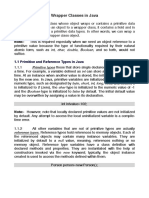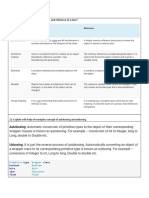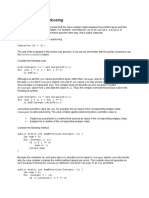0 ratings0% found this document useful (0 votes)
10 viewsWrapper Classes in Java
Wrapper classes in Java allow the conversion between primitive types and their corresponding object types, facilitating operations in object-oriented programming. Autoboxing and unboxing, introduced in J2SE 5.0, automate these conversions, enabling easier manipulation of primitives in contexts like collections and serialization. The document provides examples of autoboxing and unboxing, demonstrating how to convert between primitives and wrapper objects.
Uploaded by
Amber GuptaCopyright
© © All Rights Reserved
Available Formats
Download as PDF, TXT or read online on Scribd
0 ratings0% found this document useful (0 votes)
10 viewsWrapper Classes in Java
Wrapper classes in Java allow the conversion between primitive types and their corresponding object types, facilitating operations in object-oriented programming. Autoboxing and unboxing, introduced in J2SE 5.0, automate these conversions, enabling easier manipulation of primitives in contexts like collections and serialization. The document provides examples of autoboxing and unboxing, demonstrating how to convert between primitives and wrapper objects.
Uploaded by
Amber GuptaCopyright
© © All Rights Reserved
Available Formats
Download as PDF, TXT or read online on Scribd
You are on page 1/ 12
Wrapper classes in Java
• The wrapper class in Java provides the
mechanism to convert primitive into object and
object into primitive.
• Since J2SE 5.0, autoboxing and unboxing feature
convert primitives into objects and objects into
primitives automatically.
• The automatic conversion of primitive into an
object is known as autoboxing and vice-versa
unboxing.
Use of Wrapper classes in Java
• Java is an object-oriented programming
language, so we need to deal with objects
many times like in Collections, Serialization,
Synchronization, etc.
• Let us see the different scenarios, where we
need to use the wrapper classes.
• Change the value in Method: Java supports only call by
value. So, if we pass a primitive value, it will not change
the original value. But, if we convert the primitive
value in an object, it will change the original value.
• Serialization: We need to convert the objects into
streams to perform the serialization. If we have a
primitive value, we can convert it in objects through
the wrapper classes.
• Synchronization: Java synchronization works with
objects in Multithreading.
• java.util package: The java.util package provides the
utility classes to deal with objects.
• Collection Framework: Java collection framework
works with objects only. All classes of the collection
framework (ArrayList, LinkedList, Vector, HashSet,
LinkedHashSet, TreeSet, PriorityQueue, ArrayDeque,
etc.) deal with objects only.
The eight classes of the java.lang package are known as wrapper
classes in Java. The list of eight wrapper classes are given below:
Autoboxing
• The automatic conversion of primitive data
type into its corresponding wrapper class is
known as autoboxing, for example, byte to
Byte, char to Character, int to Integer, long to
Long, float to Float, boolean to Boolean,
double to Double, and short to Short.
• Since Java 5, we do not need to use the
valueOf() method of wrapper classes to convert
the primitive into objects.
Wrapper class Example: Primitive to
Wrapper
//Java program to convert primitive into objects
//Autoboxing example of int to Integer
public class WrapperExample1{
public static void main(String args[]){
//Converting int into Integer
int a=20;
Integer i=Integer.valueOf(a);//converting int into Integer explicitly
Integer j=a;//autoboxing, now compiler will write Integer.valueOf(a) int
ernally
System.out.println(a+" "+i+" "+j);
}}
Unboxing
• The automatic conversion of wrapper type
into its corresponding primitive type is known
as unboxing.
• It is the reverse process of autoboxing.
• Since Java 5, we do not need to use the
intValue() method of wrapper classes to
convert the wrapper type into primitives.
Wrapper class Example: Wrapper to
Primitive
//Java program to convert object into primitives
//Unboxing example of Integer to int
public class WrapperExample2{
public static void main(String args[]){
//Converting Integer to int
Integer a=new Integer(3);
int i=a.intValue();//converting Integer to int explicitly
int j=a;//unboxing, now compiler will write a.intValue() intern
ally
System.out.println(a+" "+i+" "+j);
}}
Java Wrapper classes Example
//Java Program to convert all primitives into its corresponding
//wrapper objects and vice-versa
public class WrapperExample3{
public static void main(String args[]){
byte b=10;
short s=20;
int i=30;
long l=40;
float f=50.0F;
double d=60.0D;
char c='a';
boolean b2=true;
//Autoboxing: Converting primitives into objects
Byte byteobj=b;
Short shortobj=s;
Integer intobj=i;
Long longobj=l;
Float floatobj=f;
Double doubleobj=d;
Character charobj=c;
Boolean boolobj=b2;
•
//Printing objects
System.out.println("---Printing object values---");
System.out.println("Byte object: "+byteobj);
System.out.println("Short object: "+shortobj);
System.out.println("Integer object: "+intobj);
System.out.println("Long object: "+longobj);
System.out.println("Float object: "+floatobj);
System.out.println("Double object: "+doubleobj);
System.out.println("Character object: "+charobj);
System.out.println("Boolean object: "+boolobj);
//Unboxing: Converting Objects to Primitives
byte bytevalue=byteobj;
short shortvalue=shortobj;
int intvalue=intobj;
long longvalue=longobj;
float floatvalue=floatobj;
double doublevalue=doubleobj;
char charvalue=charobj;
boolean boolvalue=boolobj;
//Printing primitives
System.out.println("---Printing primitive values---");
System.out.println("byte value: "+bytevalue);
System.out.println("short value: "+shortvalue);
System.out.println("int value: "+intvalue);
System.out.println("long value: "+longvalue);
System.out.println("float value: "+floatvalue);
System.out.println("double value: "+doublevalue);
System.out.println("char value: "+charvalue);
System.out.println("boolean value: "+boolvalue);
}}
You might also like
- Adrian Boult - A Handbook On The Technique of Conducting PDFNo ratings yetAdrian Boult - A Handbook On The Technique of Conducting PDF48 pages
- Wrapper Class - CS2030S Programming Methodology IINo ratings yetWrapper Class - CS2030S Programming Methodology II3 pages
- Autoboxing and Unboxing in Java: Chathuranga Kasun BamunusinghaNo ratings yetAutoboxing and Unboxing in Java: Chathuranga Kasun Bamunusingha41 pages
- Q1) I) Primitive Datatypes in Java Ii) Table of Primitive DatatypesNo ratings yetQ1) I) Primitive Datatypes in Java Ii) Table of Primitive Datatypes6 pages
- Object-Oriented Programming (CS F213) : BITS PilaniNo ratings yetObject-Oriented Programming (CS F213) : BITS Pilani10 pages
- Java Means Durgasoft: DURGA SOFTWARE SOLUTIONS, 202 HUDA Maitrivanam, Ameerpet, Hyd. PH: 040-64512786No ratings yetJava Means Durgasoft: DURGA SOFTWARE SOLUTIONS, 202 HUDA Maitrivanam, Ameerpet, Hyd. PH: 040-6451278612 pages
- Advanced JAVA Interview Questions You'll Most Likely Be AskedFrom EverandAdvanced JAVA Interview Questions You'll Most Likely Be AskedNo ratings yet
- Why Animals Should Not Be Kept in The Zoo EssayNo ratings yetWhy Animals Should Not Be Kept in The Zoo Essay1 page
- Organizational Behavior Is A Field of Study That Investigates The Impact That IndividualsNo ratings yetOrganizational Behavior Is A Field of Study That Investigates The Impact That Individuals7 pages
- TheLevelofSpendingHabitsamongAccountancyBusinessandManagementStudentsofTacurongNationalHighSchoolBasisforProgramIntervention PDFNo ratings yetTheLevelofSpendingHabitsamongAccountancyBusinessandManagementStudentsofTacurongNationalHighSchoolBasisforProgramIntervention PDF48 pages
- Subject: SCIENCE Grade Level: 9: Quarter: Third Week: 6No ratings yetSubject: SCIENCE Grade Level: 9: Quarter: Third Week: 67 pages
- MSDS - Material Safety Data Sheet: Product Name: Liquid Wrench Penetrating OilNo ratings yetMSDS - Material Safety Data Sheet: Product Name: Liquid Wrench Penetrating Oil4 pages
- Performance Assessment and Mass Energy Balance For Regenerative Type Air HeatersNo ratings yetPerformance Assessment and Mass Energy Balance For Regenerative Type Air Heaters98 pages

























































































